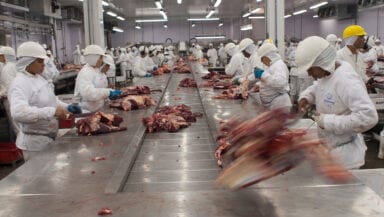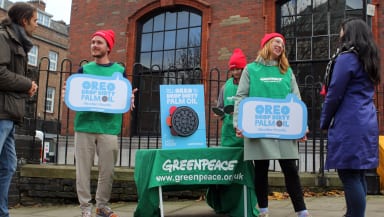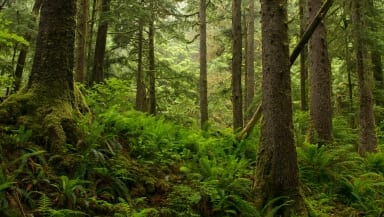Vast areas of the Brazilian Amazon, Cerrado and Pantanal are slashed and burned every year to make way for cattle ranches, or to grow soya for animal feed that’s fed to industrially produced British chickens and pigs.
As the UK’s biggest supermarket, Tesco sells more industrially produced meat than any other. From buying meat from companies owned by forest destroyers, to using more soya in its meat and dairy supply chain when compared to other leading supermarkets, Tesco is making big profits from products linked to forest destruction.
With such huge buying power, Tesco could be a leader in stripping deforestation from supply chains. Instead, it seems to be putting more effort into greenwashing.
Tesco ran social media adverts and has amended its website claiming that it supports Greenpeace’s call to stop deforestation. It also claims that by the end of 2021 it will have hit its ‘target of zero deforestation for soy animal feed through certification’.
It may look like Tesco cares but, since signing up a decade ago to cut deforestation from its supply chain by 2020, we’ve seen very little action. Here are five ways you can challenge Tesco to tell the truth about deforestation:
1. Ask Tesco if it’s still buying meat from forest destroyers
Tesco makes great play of the fact that it no longer buys Brazilian beef, but what it doesn’t address is the fact it is still buying chicken and pork from Moy Park and Pilgrim’s Pride. These are UK subsidiaries of the Brazilian meat giant JBS, a company notorious for its role in forest destruction. JBS recently announced it would continue trading with Brazilian farms that had cleared forest to produce meat until 2035.
2. Ask Tesco if the pork and chicken it sells is fed on soya from deforested land
We know it is, because an investigation by Greenpeace Unearthed, The Guardian and ITV News, traced soya from deforested land in the Brazilian Cerrado – the world’s most wildlife-rich savannah – directly to chicken on Tesco’s shelves.
Tesco uses half a million tonnes of soya every year: that’s around one sixth of the UK’s total soya imports. It told us 99% of that soya is used to feed the meat and dairy it sells and it has no idea exactly where that soya comes from. To get around this, Tesco is attempting to use ‘certified soya’. But, this will never result in a reduction of deforestation to the extent and speed needed to stop wildlife loss, end the genocide against Indigenous peoples and tackle climate breakdown.
3. Ask Tesco how soya certification really works
In 2010, Tesco committed to ‘zero net deforestation through certification by 2020’ and claims to have met this target. But what does it actually mean?
Certification can mean a variety of things, from complete segregation and traceability of sustainably grown soya (the best option) down to companies buying credits to ‘offset’ their soya use (the worst). Credit schemes claim to provide funding to farmers growing soya sustainably, but the actual soya in companies’ supply chains can still come from anywhere – including illegally deforested land. Currently nearly all of Tesco’s soya is bought under some kind of credit scheme, with only small amounts segregated and properly accounted for.
A recent Greenpeace report Destruction Certified concluded that, often, all certification schemes do is provide cover for destructive businesses to continue business as usual.
4. Ask Tesco what it means by ‘verified zero deforestation areas’
Tesco’s stated aim is to source all of its soya from ‘verified zero deforestation areas’ by 2025. But what this actually means is unclear and raises more questions than it answers.
For example: what is the definition of an area? Since what date will the area have been deforestation-free? Will supply from these areas be fully segregated? Will Tesco still accept soya grown on a deforestation-free area by a farmer still selling soya grown on deforested land, or where the trader still buys soya from other deforested areas? Who will ensure the area is truly deforestation-free?
Tesco’s entire strategy relies on commitments made by companies like Cargill that the soya in their meat and dairy supply chain comes from. But so far, these big soya traders have taken little, if any, concrete action to tackle the problem. They have even withdrawn support for a moratorium in the Cerrado similar to the moratorium that has significantly reduced deforestation for soya in the Amazon.
With Brazil’s government seemingly hellbent on weakening protection for forests even further and encouraging agricultural expansion at all costs, it looks increasingly likely that no purchase of soya from Brazil will be untainted by forest destruction somewhere along the supply chain. Even now, the Brazilian Congress is working hard to push through new legislation that will further damage precious forests, severely threaten Indigeneous peoples and have climate impacts that will affect people across the world.
5. Ask Tesco if it can end deforestation in its supply chain without reducing meat sales
More than three quarters of the world’s agricultural land is used to produce meat and dairy products – including that used to grow crops for animal feed. Despite this, only 18% of the world’s calories and 37% of its protein is produced by this system. It’s very inefficient, and there simply isn’t enough land for it to be sustainable on our finite planet.
If we’re to feed a growing population, end loss of wildlife and halt climate change, the scientific consensus is that we need to reduce global meat consumption by around 50% by 2050. Brits eat twice as much meat and almost three times as much dairy as the global average, so that means reducing our meat consumption much, by some 70% by 2030. Consciously reducing meat in favour of more plant based meals, going vegetarian, or transitioning to a vegan diet are all significant steps.
No certification scheme can solve these existential problems and Tesco knows that. Offering a wider variety of plant based foods is a start but unless it comes with an overall reduction in meat sales, it means little and will make no difference to deforestation.
What should you ask Tesco to do?
Two things. Firstly, drop forest destroyers. Any supermarket serious about commitments to end deforestation must stop buying from forest destroying companies like JBS. Trading with JBS, which is directly implicated in deforestation, not only stains Tesco’s reputation but provides finance and cover for JBS to continue its destructive practices.
Secondly, get out of factory farming. Tesco can’t sell meat at the volume it currently does without being involved in deforestation so it must replace half the meat it sells with healthy, affordable plant-based alternatives by 2025. Only when all supermarkets do these two things will customers be able to shop with confidence knowing that the food they are buying – meat, dairy or plant based – truly is deforestation-free.



